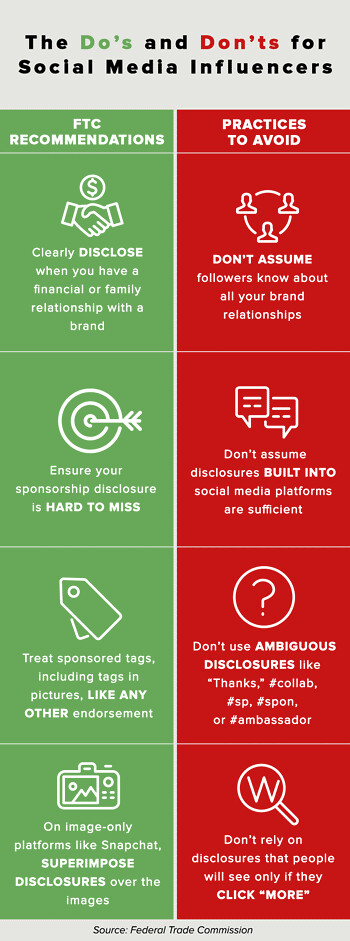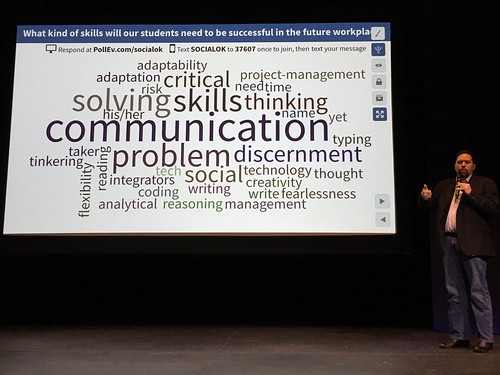Natasha Singer’s (@natashanyt) September 2017 article in the New York Times, “Silicon Valley Courts Brand-Name Teachers, Raising Ethics Issues,” presented an imbalanced view of relationships and agreements between classroom teachers and educational technology companies. It also highlighted topics which need to be discussed and possibly acted on by educators active on social media, however. In this post, I’ll explain why you might consider adding a “disclosure policy” link to your Twitter profile and other biographical websites comprising your digital footprint. I’ll also highlight how the topic of “social media influencers” and relationships to commercial entities can and should fit into digital citizenship conversations we have with students as well as others. As connected educators we need to model good digital citizenship, and a thorough personal disclosure policy linked from our social media websites is a best practice we all can follow.
In her article, Singer portrayed “teacher influencers” who promote educational technology products via social media as a new phenomenon. While the number of educators (and people overall) on social media platforms has grown tremendously in the past decade, it is not accurate to describe the ethical issues which these dynamics raise as something new or recent.
In my October 2009 post eight years ago, “FTC mandates disclosure for bloggers receiving freebies/payments,” I explained the need for educational bloggers to create disclosure policies to provide full transparency (required by U.S. law) for financial relationships and compensations received (including gifts) from different commercial entities. That advice remains sound today in September 2017. For an example, check out my own disclosure policy linked on my blog, my personal website, and my Twitter profile.
I added a link to my personal disclosure policy on my Twitter profile https://t.co/jxehE8pSR7 pic.twitter.com/atMJ3mwqpl
— Wesley Fryer ? (@wfryer) September 11, 2017
Last Friday on September 7th, the acting chair of the FCC, Maureen Ohlhausen (@MOhlhausenFTC) issued a statement targeted at “social media influencers” generally (not just in education) to “fully disclose connections to brands.” Not disclosing those connections is a violation of U.S. law, yet some social media influencers on platforms including YouTube, Instagram, Snapchat, Twitter, and others are not transparently communicating these ties to brands today.
Watch @FTC Acting Chairman @MOhlhausenFTC’s message for social media #influencers following today’s #CSGOLotto announcement: pic.twitter.com/B1Mfv9Ok27
— FTC (@FTC) September 7, 2017
The September 7th post on the FTC website, “CSGO Lotto Owners Settle FTC’s First-Ever Complaint Against Individual Social Media Influencers”, includes the clarifying statements:
“Consumers need to know when social media influencers are being paid or have any other material connection to the brands endorsed in their posts,” said FTC Acting Chairman Maureen Ohlhausen. “This action, the FTC’s first against individual influencers, should send a message that such connections must be clearly disclosed so consumers can make informed purchasing decisions.”
The issues raised in Singer’s NYT article about teacher influencers and educational technology companies have additional layers because of the status of many educators as public school employees. Employees of U.S. states and school districts are often subject to conflict-of-interest rules, which may be familiar to business office purchasing agents but historically not to classroom teachers. The rise of social media and our “publish at will” information landscape can empower anyone to be a global publisher, however, and the awareness of disclosure laws as well as conflict-of-interest rules for states and schools has not kept pace.
If you have received financial compensation or are receiving compensation for ideas and/or links you share anywhere on social media, you should have a readily accessible, public disclosure policy. This is true if you live in the United States, are subject to U.S. law, or live in another country which has similar laws regarding disclosure for brand connections. Whether you are employed by a school or other organization, you should be familiar with the conflict of interest policies to which you are subject. These could be state laws or policies, as well as organizational policies. These regulations may limit the value of gifts or in-kind contributions which you are permitted to receive, even if you openly disclose them. Rather than accepting a gift to you as an individual, conflict-of-interest rules may require that your school accept a gift or in-kind contribution on your behalf, and that donation be documented with your business office.
These conversations about “connections to brands” and influencers are valuable to have with educators, but also with students. Here are some suggested discussion prompts you might use with your own students in upcoming weeks to highlight these issues and build student awareness from both digital literacy and digital citizenship perspectives:
- Who are the social media influencers you watch, listen to, and respect the most?
- What are the platforms these social media influencers use that you follow the most? (Share the links on a collaborative document – make this into an “interactive writing” activity)
- Can you provide examples of how social media influencers you follow have encouraged you to make a purchase or ask others to spend money?
- Are you aware of any paid connections your favorite social media influencers have to commercial brands? (Do you think they receive money for promoting any products or companies?)
- Can you find via web searches any of your favorite social media influencers who disclose their brand connections on their website(s)? (Share the links on a collaborative document – make this into an “interactive writing” activity)
- Why is it important (and the law in the United States) for social media influencers to disclose their “material connections to brands?”
Depending on the age of your students, consider using the previously linked FTC blog post from September 7th to discuss these issues with students. Some may know social media influencers involved in the referenced legal case. Also consider sharing the FTC’s helpful graphic, “The Do’s and Don’ts for Social Media Influencers.” Our 8th grade daughter currently has 777 subscribers to her personal YouTube channel. You may have students in your classes with similarly significant social media followings, who may need to compose and post their own disclosure policies on their websites!

“Dos and Don’ts for Social Media Influencers” (CC BY 2.0) by Wesley Fryer
I’m glad Natasha Singer’s NYT article last weekend is encouraging educators to become more aware and promote awareness of conflict-of-interest rules and the need for disclosure statements on social media. It’s unfortunate, however, that her article grouped all “ambassador programs” and similar outreach initiatives by educational technology companies into a single heap. There are big differences in the ways companies approach and work with educators, and the care many take to ensure both conflict-of-interest rules and disclosure requirements are met. My past involvement with Apple’s Distinguished Educator Program, Google’s Certified Teacher Program, and PBS’ Digital Innovator Program are three cases in point. All three of these prominent companies have been and continue to be careful and thorough in the ways they openly address these kinds of issues with educators. Ambassador and affiliation programs have been and can continue to be mutually beneficial for not only teachers and schools, but ultimately also students who can be blessed by their own teachers who are able to effectively utilize new tools and techniques as early adapter / innovators in classrooms. Unfortunately Singer did not highlight this side of educator/brand relationships, but that is an oversight which could be remedied in the future.
grouping all ambassador programs together & treating them the same does not address the issue – many unique circumstances #edtechchat
— Eric Langhorst (@ELanghorst) September 5, 2017
Consider writing and posting your own disclosure policy on your social media websites. If you find the suggestions in this post helpful personally or to your students, please let me know with a comment here or by reaching out on Twitter to @wfryer. As is often the case with controversial headlines, Singer’s article provides excellent opportunities for “teachable moments” with students as well as other educators which we can utilize to promote greater digital literacy as well as digital citizenship.

“Carl Hooker on Digital Citizenship” (CC BY 2.0) by Wesley Fryer
If you enjoyed this post and found it useful, consider subscribing to Wes’ free, weekly newsletter. Generally Wes shares a new edition on Monday mornings, and it includes a TIP, a TOOL, a TEXT (article to read) and a TUTORIAL video. You can also check out past editions of Wes’ newsletter online free!
Did you know Wes has published several eBooks and “eBook singles?” 1 of them is available free! Check them out! Also visit Wes’ subscription-based tutorial VIDEO library supporting technology integrating teachers worldwide!
MORE WAYS TO LEARN WITH WES: Do you use a smartphone or tablet? Subscribe to Wes’ free magazine “iReading” on Flipboard! Follow Dr. Wesley Fryer on Twitter (@wfryer), Facebook and Google+. Also “like” Wes’ Facebook page for “Speed of Creativity Learning”. Don’t miss Wesley’s latest technology integration project, “Show With Media: What Do You Want to CREATE Today?”
Source : Disclosure Statements, EdTech Ambassador Programs and Digital Citizenship











